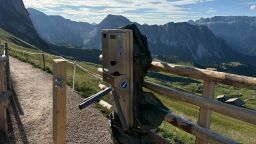Science
Bolzano Introduces Daily Tax on Visiting Dogs to Tackle Waste

The northern Italian city of Bolzano will implement a daily tax for visiting dogs starting in 2026. Owners will be required to pay 1.50 euros (approximately $2) per dog as part of a broader initiative aimed at managing the impact of pet waste on the community. This new tax is part of a contentious effort to address the challenges posed by increasing tourism in the region, a popular gateway to the breathtaking Dolomite Mountains.
Local dog owners will also face an annual tax of 100 euros per dog. The revenue generated from these taxes is intended to cover the costs associated with street cleaning and to fund the development of parks specifically designed for dogs and their owners. The city has not clarified whether dogs will be banned from regular parks, a move that has stirred concerns among pet owners.
The tax follows another controversial measure requiring dog owners to register their pets’ DNA. This initiative aims to identify owners of uncollected droppings, with penalties reaching as high as 600 euros for those who fail to clean up after their pets. According to Provincial Councilor Luis Walcher, those who have already registered their dogs’ DNA will be exempt from the new tax for the initial two years.
Community Response to the Tax
Walcher defended the tax as a fair approach that targets only dog owners, arguing that the burden of sidewalk cleanliness should not fall on the entire community. “The only filth on our city streets is dog waste,” he stated, emphasizing the need for solutions that address specific issues without overextending the community’s responsibilities.
Despite the intentions behind the tax, not everyone supports this approach. Carla Rocchi, president of ENPA, a national animal protection body, criticized the measure, describing it as damaging to the region’s reputation. “The Province of Bolzano scores an own goal with the tax on dogs and even on four-legged tourists,” she remarked in a statement. Rocchi suggested that the government should focus on civic education and responsible pet ownership rather than imposing new taxes that target families and tourists traveling with their dogs.
Rocchi highlighted the paradox of taxing animals in a region that relies heavily on tourism and hospitality. “Animals are not a luxury, but an integral part of families,” she noted. She warned that such measures could discourage responsible travel and potentially lead to increased abandonment of pets.
This initiative is part of a growing trend in many tourist destinations grappling with the pressures of overtourism. As communities seek innovative ways to manage the impact of visitors, Bolzano’s approach illustrates the complexities of balancing tourism, community welfare, and responsible pet ownership.
The introduction of the dog tax in Bolzano signals a significant shift in how cities may manage tourism-related challenges in the future. As the implementation date approaches, further public discourse is likely to unfold regarding the balance between welcoming tourists and maintaining community standards.
-

 Lifestyle4 months ago
Lifestyle4 months agoLibraries Challenge Rising E-Book Costs Amid Growing Demand
-

 Sports3 months ago
Sports3 months agoTyreek Hill Responds to Tua Tagovailoa’s Comments on Team Dynamics
-

 Sports3 months ago
Sports3 months agoLiverpool Secures Agreement to Sign Young Striker Will Wright
-

 Lifestyle3 months ago
Lifestyle3 months agoSave Your Split Tomatoes: Expert Tips for Gardeners
-

 Lifestyle3 months ago
Lifestyle3 months agoPrincess Beatrice’s Daughter Athena Joins Siblings at London Parade
-

 World3 months ago
World3 months agoWinter Storms Lash New South Wales with Snow, Flood Risks
-

 Science4 months ago
Science4 months agoTrump Administration Moves to Repeal Key Climate Regulation
-

 Science3 months ago
Science3 months agoSan Francisco Hosts Unique Contest to Identify “Performative Males”
-

 Business4 months ago
Business4 months agoSoFi Technologies Shares Slip 2% Following Insider Stock Sale
-

 Science4 months ago
Science4 months agoNew Tool Reveals Link Between Horse Coat Condition and Parasites
-

 Sports4 months ago
Sports4 months agoElon Musk Sculpture Travels From Utah to Yosemite National Park
-

 Science4 months ago
Science4 months agoNew Study Confirms Humans Transported Stonehenge Bluestones









